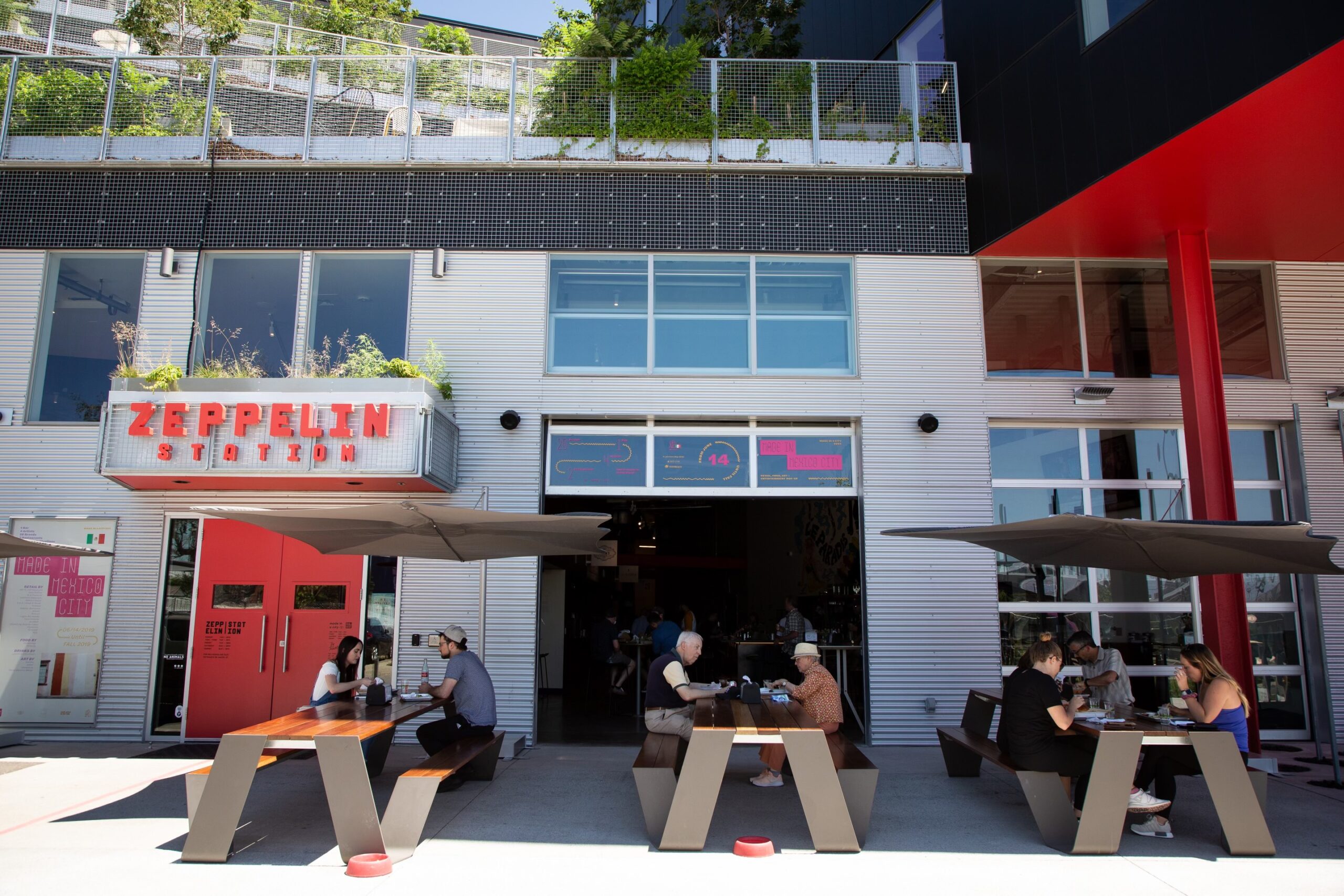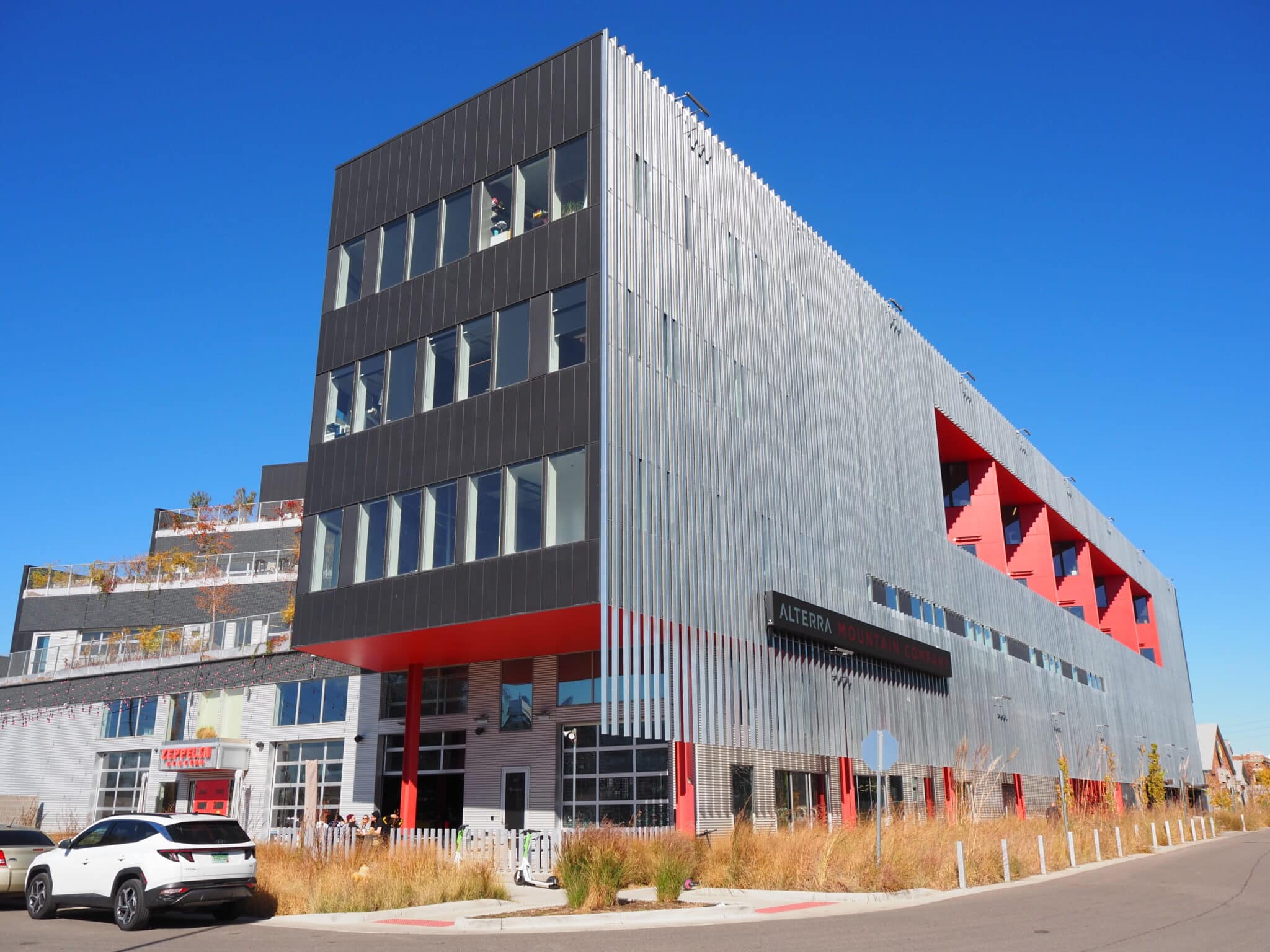
Zeppelin Station is an office building in RiNo with a food hall on the first floor. (Courtesy Zeppelin Development)
Since the pandemic began, lenders have requested a receiver for at least 10 sizable Denver-area office buildings after the building owners defaulted on a loan.
All requests received no opposition — until now.
Denver-based Zeppelin Development is pushing back in court on Wells Fargo’s recent request that a receiver be appointed for RiNo’s Zeppelin Station.
In an April 8 filing, Zeppelin — echoing comments the firm previously made to BusinessDen — said the banking giant is seeking a “predatory windfall” and attempting to “sandbag” the development firm, and offered the judge an alternative narrative of the loan dispute.
In response, Wells Fargo’s lawyers wrote that many of Zeppelin’s “alleged facts are gratuitous statements more in the nature of argument unsupported by any evidence.” And it objected to the development firm’s language.
“Defendants’ use of words like ‘sandbagging’ and ‘predatory’ to describe Plaintiff’s actions taken to protect its legitimate interests are inappropriate,” Wells Fargo wrote. “Plaintiff requests that the Court disregard these unfortunate attacks.”

Zeppelin Development CEO Kyle Zeppelin
Zeppelin Station, at 3501 Wazee St., is a four-story building with a food hall on the ground floor and the headquarters of Alterra Mountain Co. above, along with other office tenants. Zeppelin Development completed it in 2018. The next year, the firm took out a $32 million loan backed by the building from Wells Fargo.
Receivers are court-appointed caretakers that manage a building when a lender has concern about an asset, often because the owner has defaulted on the loan.
Loan agreements that building owners sign often explicitly allow the lender to appoint a receiver in the event of default. Thus, it is unusual to see pushback. Receivership requests are typically approved by a judge without a hearing, sometimes in less than 24 hours.
In its request for the receiver last month, Wells Fargo said the Zeppelin Station loan had been in default since June 2021 for failing to maintain the necessary ratios regarding property income to debt spelled out in the loan agreement. The bank said that, after an effort to sell the building in 2022 was unsuccessful, it told Zeppelin to pay $2.7 million last June to bring the ratios into compliance, but that Zeppelin failed to do so. It then said the whole loan had to be paid off, which didn’t happen either.
Zeppelin’s argument is essentially this: Don’t punish us for being a good landlord, since we’ve been making our monthly payments.
In its response filed in court, Zeppelin referred to the ratio failures as “technical defaults” that relate to the building’s food hall, which is owned by a Zeppelin-linked entity but leases space to various restaurant operators.
“The ‘technical defaults’ that give rise to this action originate exclusively from the COVID-era concessions that the Borrower’s Food Hall tenant made to help its own small business leasees survive the pandemic, and the slow recovery of the Food Hall to rebuild its revenue, that have had no monetary impact on the Bank whatsoever,” Zeppelin wrote.
Zeppelin said the terms of the 10-year loan, set to mature in 2029, allowed for a floating rate, but that it was structured to have an interest rate of 4.3% for its duration thanks to a “simultaneous Swap Agreement.” If market interest rates were below that, Zeppelin had to pay more, according to the firm. If the rates were above 4.3%, then the bank had to credit Zeppelin’s account.
Up until October 2022, low interest rates meant that Zeppelin had to pay more, according to the firm. It was only when that situation reversed that Wells Fargo started pressuring Zeppelin, the developer said.
Zeppelin said it was never late on its loan payments, although Wells Fargo stopped accepting them last August, when the firm accelerated the loan — meaning it had to be paid off.
Zeppelin also said that, unlike most other local receivership situations, Zeppelin Station has always appraised at more than the remaining balance of the loan.
The firm called the building “a profitable asset that not only affords the bank sufficient security and proceeds to support its loan, but that also affords the community in which it sits, a beacon of progress and opportunity under the Borrower’s unique leadership.”

The four-story building at 3501 Wazee St. was completed in 2018. (BusinessDen file)
Wells Fargo’s counterargument, meanwhile, is essentially this: all that matters is the contract.
In an April 15 filing, the bank stated that Zeppelin already agreed to a receivership when it signed the loan paperwork in 2019. And despite Zeppelin’s insistence in using the term “technical defaults,” the development firm already contractually agreed that the ratio failures amount to “material defaults,” Wells Fargo said.
As for the interest rate “swap,” Wells Fargo said the contract allowed it to terminate that upon default, and that the bank objected to what it felt Zeppelin was trying to imply.
“Defendants have no evidence of any improper motive regarding the Swap and its termination (and none exists),” Wells Fargo’s lawyers wrote.
Wells Fargo said it hasn’t accepted Zeppelin’s payments since August because the firm is concerned Zeppelin is trying to use the payments to create a “litigation advantage.” The bank said it will accept payments if Zeppelin signs a form that would negate the possible advantage, but the development firm won’t do so.
In its initial response, Zeppelin said no receiver could run the food hall better than the firm itself, noting Zeppelin had hired at least one “experienced hospitality group” to do so without success.
“That the receiver could operate the project in a manner that improves the revenue from the Food Hall is improbable,” the firm wrote.
Wells Fargo, meanwhile, countered that that doesn’t matter.
“This is irrelevant,” the company said. “Defendant contractually agreed to have a receiver appointed upon default.”
Zeppelin is represented by attorneys Daniel Calisher, Michael Rollin and Lauren Thompson of Denver’s Foster Graham Milstein & Calisher. Wells Fargo is represented by attorneys Clayton Barnett and Scott Evans of the Denver office of Buchalter, along with attorneys from the firm’s Phoenix office.
“I am appalled”: Other developers back Zeppelin
Zeppelin Development has supporters in the local development scene.
In a phone call with BusinessDen, David Zucker, CEO of Denver-based Zocalo Community Development, said banks need to exercise discretion and “discern between what is a problem — a real problem — and what is in the banker’s eye an annoyance.”
“Lenders that cannot see the weight of their actions are wearing the fabric of our downtowns down,” Zucker said.

David Zucker
Zucker emphasized that Zeppelin was making its regular requirement payments and said the building has a “great anchor tenant” in Alterra. He praised the legacy of Zeppelin Development founder Mickey Zeppelin, an early player in the redevelopment of both LoDo and RiNo, and said the firm deserves credit for taking on its atypical designs.
“If everybody just goes and does the easy layup, our built environment is sanitized and boring,” Zucker said.
Zucker said all developers “are feeling the pressure.”
“Interest rates aren’t going to be declining anytime soon,” he said. “So I think there’s going to be more of this.”
Zeppelin Development also shared with BusinessDen a message of support it received from Fiona Arnold. The founder of Denver-based Mainspring said she was “so glad” the firm spoke out.
“With everything else going on the fact the loan is being paid should be celebrated at WF!” Arnold wrote. “Instead, they are using their typical no brain no thought standard practice and will cause massive damage to the building, to its value and to Zeppelin. I am appalled.”
Zeppelin, Wells Fargo issue dueling statements
In a statement to BusinessDen last week, Zeppelin Development said a fire sale of the building “would result in turning the project over to speculators, and an immediate closure of the market hall at the cost of tenants and the neighborhood.”
“Irrespective of any community interests, and despite numerous attempts to come up with a middle-ground solution, Wells Fargo, through their California-based office and attorneys, continues to strong-arm and belligerently press ahead,” Zeppelin said. “Our continued attempts at working with Wells Fargo on a local level, who at least claim to have the community interests in mind, have been flatly rejected.”
In its own statement, Wells Fargo said its request that Zeppelin pay $2.7 million to “remargin” the loan last year was an attempt at a middle ground.
“It is not unusual for lenders to work with borrowers and guarantors for a period of time, but eventually, the lender is required to make a decision,” Wells Fargo said.

Zeppelin Station is an office building in RiNo with a food hall on the first floor. (Courtesy Zeppelin Development)
Since the pandemic began, lenders have requested a receiver for at least 10 sizable Denver-area office buildings after the building owners defaulted on a loan.
All requests received no opposition — until now.
Denver-based Zeppelin Development is pushing back in court on Wells Fargo’s recent request that a receiver be appointed for RiNo’s Zeppelin Station.
In an April 8 filing, Zeppelin — echoing comments the firm previously made to BusinessDen — said the banking giant is seeking a “predatory windfall” and attempting to “sandbag” the development firm, and offered the judge an alternative narrative of the loan dispute.
In response, Wells Fargo’s lawyers wrote that many of Zeppelin’s “alleged facts are gratuitous statements more in the nature of argument unsupported by any evidence.” And it objected to the development firm’s language.
“Defendants’ use of words like ‘sandbagging’ and ‘predatory’ to describe Plaintiff’s actions taken to protect its legitimate interests are inappropriate,” Wells Fargo wrote. “Plaintiff requests that the Court disregard these unfortunate attacks.”

Zeppelin Development CEO Kyle Zeppelin
Zeppelin Station, at 3501 Wazee St., is a four-story building with a food hall on the ground floor and the headquarters of Alterra Mountain Co. above, along with other office tenants. Zeppelin Development completed it in 2018. The next year, the firm took out a $32 million loan backed by the building from Wells Fargo.
Receivers are court-appointed caretakers that manage a building when a lender has concern about an asset, often because the owner has defaulted on the loan.
Loan agreements that building owners sign often explicitly allow the lender to appoint a receiver in the event of default. Thus, it is unusual to see pushback. Receivership requests are typically approved by a judge without a hearing, sometimes in less than 24 hours.
In its request for the receiver last month, Wells Fargo said the Zeppelin Station loan had been in default since June 2021 for failing to maintain the necessary ratios regarding property income to debt spelled out in the loan agreement. The bank said that, after an effort to sell the building in 2022 was unsuccessful, it told Zeppelin to pay $2.7 million last June to bring the ratios into compliance, but that Zeppelin failed to do so. It then said the whole loan had to be paid off, which didn’t happen either.
Zeppelin’s argument is essentially this: Don’t punish us for being a good landlord, since we’ve been making our monthly payments.
In its response filed in court, Zeppelin referred to the ratio failures as “technical defaults” that relate to the building’s food hall, which is owned by a Zeppelin-linked entity but leases space to various restaurant operators.
“The ‘technical defaults’ that give rise to this action originate exclusively from the COVID-era concessions that the Borrower’s Food Hall tenant made to help its own small business leasees survive the pandemic, and the slow recovery of the Food Hall to rebuild its revenue, that have had no monetary impact on the Bank whatsoever,” Zeppelin wrote.
Zeppelin said the terms of the 10-year loan, set to mature in 2029, allowed for a floating rate, but that it was structured to have an interest rate of 4.3% for its duration thanks to a “simultaneous Swap Agreement.” If market interest rates were below that, Zeppelin had to pay more, according to the firm. If the rates were above 4.3%, then the bank had to credit Zeppelin’s account.
Up until October 2022, low interest rates meant that Zeppelin had to pay more, according to the firm. It was only when that situation reversed that Wells Fargo started pressuring Zeppelin, the developer said.
Zeppelin said it was never late on its loan payments, although Wells Fargo stopped accepting them last August, when the firm accelerated the loan — meaning it had to be paid off.
Zeppelin also said that, unlike most other local receivership situations, Zeppelin Station has always appraised at more than the remaining balance of the loan.
The firm called the building “a profitable asset that not only affords the bank sufficient security and proceeds to support its loan, but that also affords the community in which it sits, a beacon of progress and opportunity under the Borrower’s unique leadership.”

The four-story building at 3501 Wazee St. was completed in 2018. (BusinessDen file)
Wells Fargo’s counterargument, meanwhile, is essentially this: all that matters is the contract.
In an April 15 filing, the bank stated that Zeppelin already agreed to a receivership when it signed the loan paperwork in 2019. And despite Zeppelin’s insistence in using the term “technical defaults,” the development firm already contractually agreed that the ratio failures amount to “material defaults,” Wells Fargo said.
As for the interest rate “swap,” Wells Fargo said the contract allowed it to terminate that upon default, and that the bank objected to what it felt Zeppelin was trying to imply.
“Defendants have no evidence of any improper motive regarding the Swap and its termination (and none exists),” Wells Fargo’s lawyers wrote.
Wells Fargo said it hasn’t accepted Zeppelin’s payments since August because the firm is concerned Zeppelin is trying to use the payments to create a “litigation advantage.” The bank said it will accept payments if Zeppelin signs a form that would negate the possible advantage, but the development firm won’t do so.
In its initial response, Zeppelin said no receiver could run the food hall better than the firm itself, noting Zeppelin had hired at least one “experienced hospitality group” to do so without success.
“That the receiver could operate the project in a manner that improves the revenue from the Food Hall is improbable,” the firm wrote.
Wells Fargo, meanwhile, countered that that doesn’t matter.
“This is irrelevant,” the company said. “Defendant contractually agreed to have a receiver appointed upon default.”
Zeppelin is represented by attorneys Daniel Calisher, Michael Rollin and Lauren Thompson of Denver’s Foster Graham Milstein & Calisher. Wells Fargo is represented by attorneys Clayton Barnett and Scott Evans of the Denver office of Buchalter, along with attorneys from the firm’s Phoenix office.
“I am appalled”: Other developers back Zeppelin
Zeppelin Development has supporters in the local development scene.
In a phone call with BusinessDen, David Zucker, CEO of Denver-based Zocalo Community Development, said banks need to exercise discretion and “discern between what is a problem — a real problem — and what is in the banker’s eye an annoyance.”
“Lenders that cannot see the weight of their actions are wearing the fabric of our downtowns down,” Zucker said.

David Zucker
Zucker emphasized that Zeppelin was making its regular requirement payments and said the building has a “great anchor tenant” in Alterra. He praised the legacy of Zeppelin Development founder Mickey Zeppelin, an early player in the redevelopment of both LoDo and RiNo, and said the firm deserves credit for taking on its atypical designs.
“If everybody just goes and does the easy layup, our built environment is sanitized and boring,” Zucker said.
Zucker said all developers “are feeling the pressure.”
“Interest rates aren’t going to be declining anytime soon,” he said. “So I think there’s going to be more of this.”
Zeppelin Development also shared with BusinessDen a message of support it received from Fiona Arnold. The founder of Denver-based Mainspring said she was “so glad” the firm spoke out.
“With everything else going on the fact the loan is being paid should be celebrated at WF!” Arnold wrote. “Instead, they are using their typical no brain no thought standard practice and will cause massive damage to the building, to its value and to Zeppelin. I am appalled.”
Zeppelin, Wells Fargo issue dueling statements
In a statement to BusinessDen last week, Zeppelin Development said a fire sale of the building “would result in turning the project over to speculators, and an immediate closure of the market hall at the cost of tenants and the neighborhood.”
“Irrespective of any community interests, and despite numerous attempts to come up with a middle-ground solution, Wells Fargo, through their California-based office and attorneys, continues to strong-arm and belligerently press ahead,” Zeppelin said. “Our continued attempts at working with Wells Fargo on a local level, who at least claim to have the community interests in mind, have been flatly rejected.”
In its own statement, Wells Fargo said its request that Zeppelin pay $2.7 million to “remargin” the loan last year was an attempt at a middle ground.
“It is not unusual for lenders to work with borrowers and guarantors for a period of time, but eventually, the lender is required to make a decision,” Wells Fargo said.
